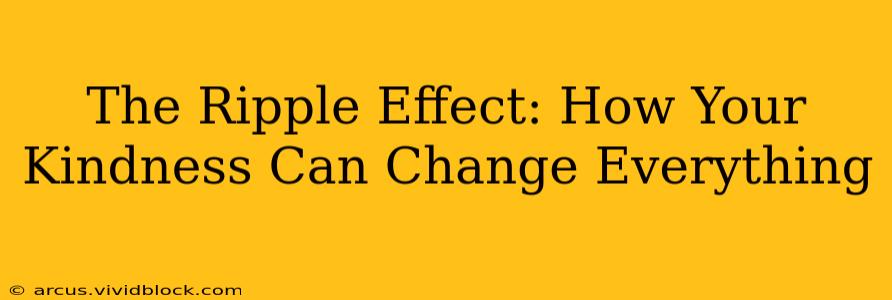Kindness. It's a word that evokes warmth, compassion, and positive feelings. But beyond the fuzzy feeling it gives us, kindness possesses a remarkable power: the ripple effect. A single act of kindness can create a chain reaction, impacting not only the recipient but also those around them, extending its influence far beyond what we might initially imagine. This isn't just wishful thinking; it's a scientifically supported phenomenon with profound implications for our personal well-being and the world at large. This article delves into the science behind the ripple effect of kindness and explores practical ways you can cultivate it in your life.
What is the Ripple Effect of Kindness?
The ripple effect, in the context of kindness, refers to the cascading effect of a single act of compassion. Like a pebble dropped into a still pond, the initial impact creates expanding circles of influence. One kind act can inspire others to perform similar acts, triggering a chain reaction of positive behavior that spreads throughout communities and even beyond. This isn't limited to grand gestures; even small acts of kindness can have surprisingly significant consequences.
Why Does Kindness Have a Ripple Effect?
The ripple effect of kindness stems from several interconnected factors:
- Emotional Contagion: Emotions are contagious. When we witness kindness, it evokes positive emotions in us, making us more likely to act kindly ourselves. This creates a feedback loop where kindness begets more kindness.
- Social Norms: Kindness reinforces social norms of cooperation and empathy. When people see others behaving kindly, they're more likely to perceive kindness as the expected social behavior, leading to greater prosocial actions.
- Increased Well-being: Acts of kindness benefit not only the recipient but also the giver. Studies consistently show that performing kind acts boosts our mood, reduces stress, and increases overall happiness. This positive experience further motivates us to continue engaging in kind behaviors.
- Reciprocity: Human beings are wired for reciprocity. When we receive kindness, we often feel compelled to reciprocate, passing the kindness forward. This is a key mechanism driving the ripple effect.
How Can I Participate in the Ripple Effect?
You don't need to be a philanthropist to participate in the ripple effect. Even small gestures can have a profound impact. Here are some practical ways to cultivate kindness and contribute to this positive chain reaction:
- Practice random acts of kindness: These can be as simple as holding a door open, offering a compliment, or helping someone carry groceries.
- Volunteer your time: Contributing to a cause you care about is a powerful way to spread kindness and connect with your community.
- Show empathy and compassion: Listen actively to others, validate their feelings, and offer support when needed.
- Practice gratitude: Expressing gratitude to others strengthens relationships and fosters a sense of connection.
- Be mindful of your words and actions: Kindness is not just about grand gestures; it's about consistently choosing to be considerate and respectful in your interactions with others.
What are the Long-Term Effects of Spreading Kindness?
The long-term effects of spreading kindness extend far beyond immediate interactions. By participating in the ripple effect, we contribute to:
- Stronger communities: Kindness fosters a sense of belonging and connection, strengthening social bonds within communities.
- Increased social cohesion: Kindness reduces social divisions and promotes a more inclusive and harmonious society.
- Improved mental and physical health: Both givers and receivers of kindness experience improved well-being.
- A more positive and hopeful world: The cumulative effect of countless acts of kindness creates a more optimistic and compassionate world for everyone.
Can Kindness Really Change the World?
Yes! While it might seem like a small thing, individual acts of kindness, multiplied across countless people, can create significant societal change. The ripple effect is not just a metaphor; it's a tangible force for good, transforming lives and communities one act of kindness at a time.
Frequently Asked Questions (FAQ)
Q: Are there any studies that support the ripple effect of kindness?
A: Yes, numerous studies in psychology and sociology demonstrate the contagious nature of positive emotions and the cascading effect of prosocial behavior. Research consistently shows that acts of kindness trigger positive emotions in both the giver and the receiver, leading to a chain reaction of further kindness.
Q: How can I measure the impact of my kindness?
A: While it's difficult to quantify the exact impact of each act of kindness, the focus shouldn't be on measurement but on the act itself. The reward is in the positive emotions you experience and the positive impact you have on others. Witnessing the positive response of someone you've helped is a powerful indicator of the ripple effect in action.
Q: What if my act of kindness isn't reciprocated?
A: The value of kindness lies in the act itself, not in the expectation of reciprocity. Focusing on the intention behind your act and the positive impact it has on the recipient is more important than receiving something in return.
The ripple effect of kindness is a powerful force for good. By consciously choosing kindness in our daily lives, we can contribute to a more compassionate and interconnected world. Let's all be part of this positive chain reaction.

